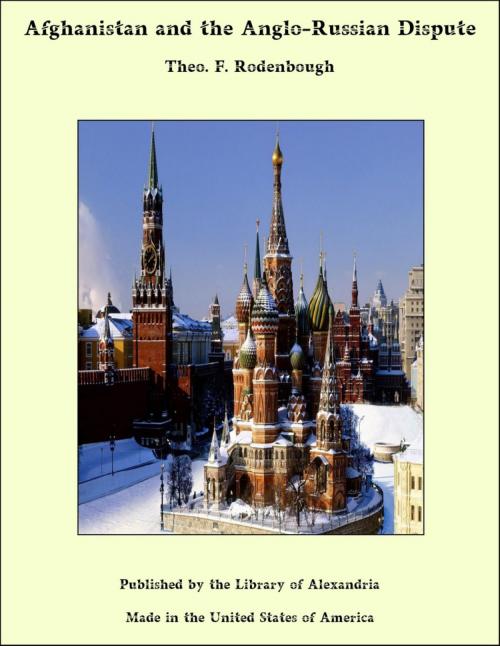Afghanistan and the Anglo-Russian Dispute
Nonfiction, Religion & Spirituality, New Age, History, Fiction & Literature| Author: | Theo. F. Rodenbough | ISBN: | 9781465602039 |
| Publisher: | Library of Alexandria | Publication: | March 8, 2015 |
| Imprint: | Language: | English |
| Author: | Theo. F. Rodenbough |
| ISBN: | 9781465602039 |
| Publisher: | Library of Alexandria |
| Publication: | March 8, 2015 |
| Imprint: | |
| Language: | English |
In universal history there is no more interesting subject for the consideration of the political student than the record of Russian progress through Central Asia. In one sense this advance is a practical reestablishment or extension of the influence of the Aryan race in countries long dominated by peoples of Turki or Mongolian origin; in another sense it has resulted in a transition from the barbarism or rude forms of Asiatic life to the enlightenment and higher moral development of a European age. In a religious sense it embodies a crusade against Oriental fanaticism; and it is a curious feature of the Anglo-Russian dispute, that upon a question of temporal gain, the greatest Christian nation finds itself allied with the followers of Buddha and Mahomet against Russia under the Banner of the Cross. The descendants of the great Peter have opened up in Central Asia a new region which, if as yet it has not been "made to blossom as the rose," has nevertheless profited by the introduction of law, order, and a certain amount of industrial prosperity. Russia commenced her relations with Central Asia as early as the sixteenth century. Not only through embassies sent, but by military expeditions; these, however, at that time were private ventures by roving Cossacks and other inhabitants of Southern Russia. ized government expeditions commenced with Peter the Great, who in 1716-17 sent two exploring parties into the Central Asian deserts--Bekovitch to Khiva, and Likhareff to the Black Irtish. These expeditions were undertaken in search of gold, supposed to exist in those regions, but failed in their object; the detachment under Bekovitch being entirely destroyed after reaching Khiva. Peter next turned his attention to the country bordering upon the southern shores of the Caspian Sea; taking advantage of Persian embarrassments, with the consent of the Shah and of the Sultan he acquired, in 1722-3, the provinces of Gilan, Mazanderan, and Asterabad; but the great expense of maintaining a large garrison so remote from Russia, and the unhealthiness of the locality, induced the Russian Government, in 1732, to restore the districts to Persia. In the same year Abul-Khair, the Khan of the Little Kirghiz Horde, voluntarily submitted to Russia.
In universal history there is no more interesting subject for the consideration of the political student than the record of Russian progress through Central Asia. In one sense this advance is a practical reestablishment or extension of the influence of the Aryan race in countries long dominated by peoples of Turki or Mongolian origin; in another sense it has resulted in a transition from the barbarism or rude forms of Asiatic life to the enlightenment and higher moral development of a European age. In a religious sense it embodies a crusade against Oriental fanaticism; and it is a curious feature of the Anglo-Russian dispute, that upon a question of temporal gain, the greatest Christian nation finds itself allied with the followers of Buddha and Mahomet against Russia under the Banner of the Cross. The descendants of the great Peter have opened up in Central Asia a new region which, if as yet it has not been "made to blossom as the rose," has nevertheless profited by the introduction of law, order, and a certain amount of industrial prosperity. Russia commenced her relations with Central Asia as early as the sixteenth century. Not only through embassies sent, but by military expeditions; these, however, at that time were private ventures by roving Cossacks and other inhabitants of Southern Russia. ized government expeditions commenced with Peter the Great, who in 1716-17 sent two exploring parties into the Central Asian deserts--Bekovitch to Khiva, and Likhareff to the Black Irtish. These expeditions were undertaken in search of gold, supposed to exist in those regions, but failed in their object; the detachment under Bekovitch being entirely destroyed after reaching Khiva. Peter next turned his attention to the country bordering upon the southern shores of the Caspian Sea; taking advantage of Persian embarrassments, with the consent of the Shah and of the Sultan he acquired, in 1722-3, the provinces of Gilan, Mazanderan, and Asterabad; but the great expense of maintaining a large garrison so remote from Russia, and the unhealthiness of the locality, induced the Russian Government, in 1732, to restore the districts to Persia. In the same year Abul-Khair, the Khan of the Little Kirghiz Horde, voluntarily submitted to Russia.















